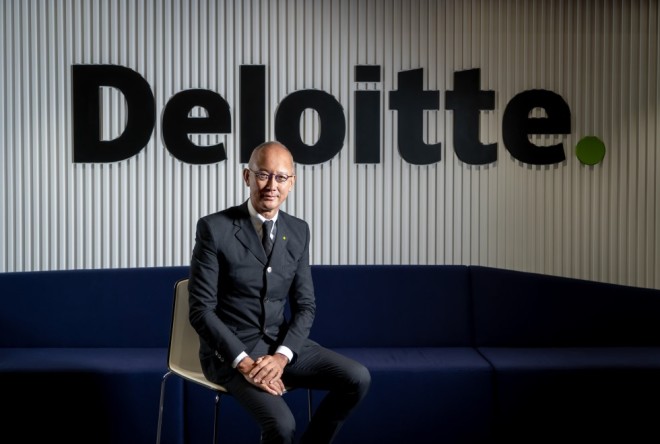
Future of Work, and Workplace
Stepping into the office of top accounting and professional services firm Deloitte in Pacific Place, Hong Kong, one is struck by the spacious, open-plan layout that resembles a co-working space. Philip TSAI, Chairman of Deloitte China, agrees that the days when seniors worked and acted in isolation from their subordinates are long past. Collaboration is the key trend in today’s digitalized world.

[Sponsored Article]
Gone are the days when management officials were secluded from their underlings, segregated in plush offices far removed from rank-and-file employees toiling away in crammed cubicles. The office space’s traditional hierarchical structure has given way to an ethos of teamwork conducted on a far more equal basis.
Technological advancement is a key factor behind this change. “In the US and Europe – with the advent of technology, the Internet and virtual teams – many staff members do not come to the office to work,” explains Tsai. “We try to be at the forefront of all these [developments] because people are our most important asset.”
Deloitte is indeed at the forefront of this rapidly advancing corporate culture and business environment. “We have to change the set-up of our offices to accommodate the latest trends,” says Tsai.
Even experienced colleagues need to adapt and accept today’s more flexible working environment. “These days, knowledge changes and depreciates very quickly. It loses its value very quickly, and its shelf life is very short.”
Teamwork, and an open and flexible working environment to facilitate it, is more important than ever. This is also believed to appeal to millennial employees, many of whom prefer an adaptable working style.
A disruptive force
Technological advancement is driving the change, which has transformed the accounting and auditing profession too. Rather than preparing records and other information manually, these days information is available at the click of a button. The rise of artificial intelligence (AI), automation, robotics, blockchain, cloud computing and by no means least of all, data analytics, means practitioners' roles are changing.
“Now everything is being interconnected by the Internet of Things, so professionals need to be more interpretive, to be able to interpret data, information and trends. The emphasis now is on the services we are providing to our clients, the personal touch,” says Tsai, stressing once again the need for professionals to team up and collaborate with others.
Tsai’s colleagues now spend more time doing big data analysis, “looking for the trends, exceptions, tell-tale signs not easily identified in the old days”, he adds. Technology has been a great help to the profession, as well as a disruptive force.
In the last couple of years, the success of any business entity has depended not on skills but on whom it works with. Tech giants such as Alibaba and Apple have formed alliances with Deloitte due to its provision of services for clients, explains Tsai.
Other accounting and consulting firms are also likely to have re-examined their roles and services in response to new players in the market and the growing application of AI and other advanced technology across many fields.
Preparing for the digital world

But still, opportunities abound. Deloitte has branched into financial advisory, risk advisory and consulting, while a small team with a primary focus on blockchain technology is working in the firm’s office at co-working space WeWork.
The Deloitte Centre for the Edge in San Francisco conducts original research and develops substantive points of view for new corporate growth. It has come to the conclusion that the success of a business entity hinges on its ability to manage the diverse “knowledge flow” available online.
Deloitte has recruited many digital-savvy young graduates, including system engineers who, according to Tsai, enjoy the WeWork environment, remote working, and flexible working modes and hours. “We treasure a mix of skills, experience and knowledge, and millennials are going to make up a huge majority of our teams,” declares Tsai.
For potential recruits, Tsai adds, personal attributes carry significant weight despite the prominence of technology. He characterises those attributes as soft skills – communication and interpersonal skills and, in particular, the ability to work with others and to get maximum efficiency out of smart machines.
A sound education is, of course, also indispensable. But Tsai says he would prefer candidates with a broad general knowledge, whether they are business graduates or not.
“We would like to take on not only the brightest from business schools, but also look at engineering, science, or one day arts faculty graduates as potential recruits. Interestingly, it is only in China and Asia-Pacific that most of our colleagues are business students,” says Tsai.
“In the UK, some of our partners and colleagues are engineers by training, and only took up accounting after they joined the firm. In this day and age, we have clients from all industries. Having a different background knowledge base will only be a plus.”